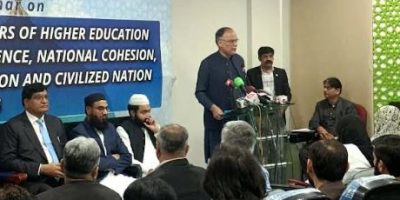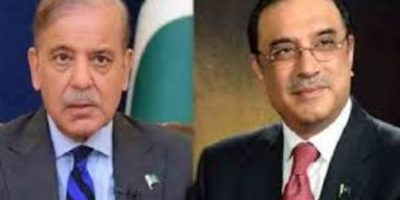VCs Meeting with the President – Drug Control & Challenges of Differently-abled Students

Islamabad, November 12, 2020 : President of Pakistan Dr. Arif Alvi has stressed the need for collective efforts to root out the growing menace of drug addiction in university campuses, and to extend all-out facilitation to differently-abled students. He was addressing on Thursday an online meeting with the Vice Chancellors of all public and private sector universities on issues regarding differently-abled students as well as drug addiction.
The meeting was also attended by Federal Minister for Education Shafqat Mahmood, Federal Minister for Narcotics Control Mr. Muhammad Azam Khan Swati, Federal Minister for Human Rights Dr. Shireen M. Mazari, Chairman HEC Tariq Banuri, and Director General Anti-Narcotics Force Major General Muhammad Arif Malik.
During the first session on proliferation of drug use on campuses, the meeting deliberated on measures to curtail drug use through student counselling services, creation of a hotline, formation of a whistler-blower mechanism, penalization of elements involved in use and supply of drugs, constitution of parent-teacher coordination bodies, student counselling, creation of a hotline, and coordination with rehabilitation facilities. Steps necessary for supply reduction, demand reduction, progress review, and de-stigmitization of institutions were also brought under consideration.
Mr. Azam Swati briefed the meeting about various initiatives for drug control taken by his Ministry, and the Ministry’s desire to work in close coordination with the universities to curb this increasing menace. He suggested a number of steps to be taken and implemented by the universities.
It was decided that all the relevant stakeholders will coordinate and come up with a concrete policy on curtailing use of drugs on campuses, latest by March. The President directed HEC to develop appropriate policy guidelines, in consultation with all the stakeholders, to support universities address this issue in an effective manner.
Dr. Alvi stressed that universities must take every step necessary to make their campuses safe from drugs. “This is not only a moral imperative. Universities have a legal responsibility to implement all relevant national laws.” He noted that environment of many universities around the world is threatened today by the proliferation of drugs.
He emphasised the role of media in creating awareness about the consequences of drug usage. He said that law enforcement agencies are playing an active role in dealing with the issue, yet there is a need for direct engagement with the youth. He informed that the Ministry of Health has been tasked to develop a broader helpline to deal with health-related issues, particularly illicit use of drugs. He said that the academia must utilize the services of psychologists and psychiatrists, social workers, and non-government organizations in issues pertaining to drug usage.
Vice Chancellors of Punjab University, Peshawar University, Haripur University, BUITEMS Quetta and SZABIST Karachi along with others shared how they are dealing with this challenge at present and gave suggestions to strengthen these efforts with coordination of all the stakeholders.
During the second session on differently abled students, the participants pondered upon measures to bring such students to mainstream and facilitate them in every possible manner. Different suggestions by participants included age relaxation for differently-abled students, wheelchair friendly buildings, scholarship and fee waivers, and special transport facility within campuses.
Minister Dr. Mazari informed the gathering that ICT Rights of Persons with Disability Act 2020 has already been passed. She said it extends to the whole of ICT territory and so is also binding on universities in this area. She added that other provinces may adopt this Act through passage of resolution from the respective constituent assemblies. She asked HEC to review its existing policy for differently abled students in light of this Act.
Chairman HEC Tariq Banuri highlighted HEC’s initiatives to facilitate differently-abled students, including promulgation of HEC policy on the subject, distribution of wheelchairs, establishment of Well Being Centres and formation of Student Clubs under Prime Minister’s Kamyab Jawan Programme.
The President appreciated HEC’s efforts to mainstream such students in the higher education sector. He observed that special attention needs to be given to students with visual impairment, hearing disabilities or mobility challenges. He said that he himself has taken the task for defining categories of differently abled students so that there should be a clear distinction among students with different needs.
He expected that the Vice Chancellors will take lead in implementation of policies on both the issues of drug control as well as facilities for differently abled students.
Related News

Lahore seminar links Prophet’s “P.B.U.H” life with national cohesion goals
ISLAMABAD/LAHORE, FEB 21 /DNA/ – The Higher Education Commission (HEC), in collaboration with the MinistryRead More

President, PM strongly condemn terrorist attack on security forces in Bannu
ISLAMABAD, Feb 21 (DNA): President Asif Ali Zardari and Prime Minister Muhammad Shehbaz Sharif, Saturday,Read More


Comments are Closed